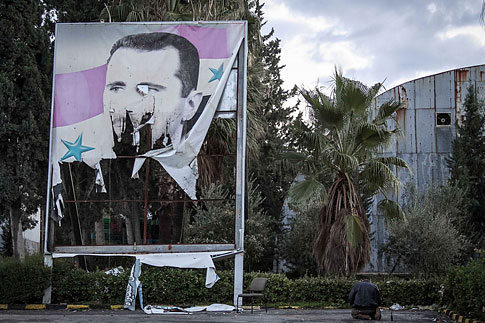
The trove of horrific photos that surfaced Monday purporting to document systematic torture, starvation and execution of prisoners by Syrian authorities is exactly the kind of evidence prosecutors look for when seeking to bring charges of crimes against humanity in international courts. Yet legal experts say any such trial is highly unlikely.
“The obvious route of justice here would be the International Criminal Court,” says Reed Brody, an expert on international justice at Human Rights Watch. The ICC was created in The Hague, Netherlands, in 2002 to prosecute exactly the kind of outrages the report lays out in the sort of chilling bureaucratic detail seen in previous war crime trials, from the prosecution of Nazi officers at Nuremberg onward. And even though Syria is not among the 122 nations that have made themselves accountable to the ICC its officials still could be referred to The Hague by a vote of the United Nations Security Council.
“And we believe obviously that that’s what should happen, considering the evidence that serious crimes have been committed in Syria,” Brody says. “The problem is the Russian nyet.”
As a permanent member of the Security Council, Russia can veto any action there. And as a backer of Syrian President Bashar Assad, Moscow has repeatedly blocked condemnations of human rights violations in the country — which would include appalling atrocities attributed to assorted rebel groups arrayed against the central government. The thwarted demands for justice included a letter signed by 58 nations a year ago to refer the situation in Syria to the ICC.
Russia – along with China, which frequently objects on principle to outside scrutiny of a state’s behavior toward its own people – also is in a position to prevent establishment of a U.N. court specifically devoted to prosecuting war crimes in Syria, as were established after wars in Yugoslavia, Rwanda, Sierra Leone and elsewhere.
There may be one other option: Under the legal concept of “universal jurisdiction,” courts in other nations sometimes prosecute severe human rights abuses. In 1998, Gen. Augusto Pinochet was arrested in Britain for a warrant issued in Spain charging the former Chilean ruler with torturing Spanish citizens while in power. “But this is also a long shot, because many countries that have universal jurisdiction legislation place conditions on its use,” says Yuval Shany, an expert on international law at Hebrew University Law School, where he is dean.
And then there’s the question of the strength of the evidence – some 55,000 photos showing 11,000 bodies, nearly 10 percent of the death toll of the entire war – first published by The Guardian and CNN. Would it help convict Assad, or other senior Syrian officials, if a case were brought?
“This is horizontal evidence of the crime base, as opposed to vertical evidence that links the people on top to the crime,” says Brody, who spoke en route to Senegal, where he is supporting the prosecution in a special court of Hissene Habre on charges of systematic torture and executions when he ruled Chad. “Obviously Assad didn’t kill any of these people, but at a certain point things become so overwhelming it becomes hard to imagine that the leader didn’t know about this.”
Shany was less confident. He did not question the veracity of the report, which was prepared by three highly respected experts on war crimes, nor its funding by Qatar, a Gulf state supporting rebels in the Syrian civil war. The problem, Shany says, is legal precedents emerging in recent judgments, specifically the 2012 acquittal on appeal of two Croatian generals earlier convicted of targeting Serb civilians by the International Criminal Tribunal for the former Yugoslavia.
“It’s tough, and it’s becoming tougher” to convict senior officials for war crimes, says Shany. The Croatia case “raised the bar for command responsibility – from a negligence to an awareness standard.”
At the ICC, the only head of state convicted so far of war crimes is former Liberian President Charles Taylor, now serving a sentence of 50 years. But then, as incumbent Kenyan President Uhuru Kenyatta has complained in his own trial, so far only Africans have faced prosecution before the ICC. That appears to be partly because so many African countries – 33 – have submitted themselves to its jurisdiction. But Shany says it may also reflect the “geopolitical reality” that African countries are less likely to have a protector on the Security Council.
More Must-Reads from TIME
- Donald Trump Is TIME's 2024 Person of the Year
- Why We Chose Trump as Person of the Year
- Is Intermittent Fasting Good or Bad for You?
- The 100 Must-Read Books of 2024
- The 20 Best Christmas TV Episodes
- Column: If Optimism Feels Ridiculous Now, Try Hope
- The Future of Climate Action Is Trade Policy
- Merle Bombardieri Is Helping People Make the Baby Decision
Contact us at letters@time.com